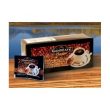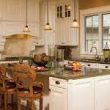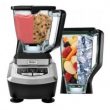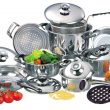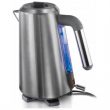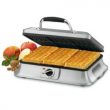There are very few businesses where the most frequently used piece of equipment in the building isn’t the kettle. But if you have a larger staff then sometimes, this is a major waste of time because you can never get enough coffee made for everyone. To save a rebellion and to make the coffee run more efficient, a commercial coffee machine may be the answer. So what are the options?
For the Office
Just like making coffee at home, there are various ways to make coffee using commercial coffee machines. Each has its benefits and cost differences.
| Coffee Type | Economy (*=cheapest) | Comments |
| Fresh bean | * | Great value and also said to produce the best quality coffee |
| Freeze dried | * | Good quality and very easy to use with a minimal amount of cleaning needed |
| Filter | ** | Great for basic black or white coffees but cannot make speciality coffee preferred by many people |
| Pods / capsules | *** | Most expensive option but very good quality and a great range |
All speciality coffees have their roots in espresso, which is the small shot of coffee made from passing hot water through ground coffee at a high pressure. It can then be blended with milk or hot water as well as other ingredients to create the different varieties such as cappuccino or latte. To produce a range of speciality coffees you either need a machine that can make espresso as well as steaming or foaming milk, or use coffee pods.
Small Office
Keurig B155 OfficePRO Premier Brewing SystemThis coffee machine is perfect for the smaller office as it can produce a whole range of hot and cold drinks include coffee, tea and hot chocolate. It works with the touch of a button and the drink is ready in less than a minute as well as being fully programmable for elements such as the brew temperature. It even has a choice of four cup sizes, a removable drip tray for easy cleaning and can accommodate travel mugs for those working out of the office.
Medium Office
Espressione 10-Cup Digital Filtered Coffee Maker, Stainless SteelThis is a great small office example of a basic coffee maker that can create up to 10 cups at one time. It also featured AccuFlavour that allows the selection of both the strength of the coffee and the type of brewing used. It is electronic, programmable so can be set away to make the coffee without supervision, and also features a 24-hour timer so can be set to have the coffee ready for the first person into the office. The water tank is removable for ease of cleaning and the glass carafe produced is 1 ½-litre capacity. It comes with a 1 year limited warranty and measures 13.5 x 14 x 16 inches.
Large Office
Newco CB Commercial Barista Coffee BrewerThis coffee maker can brew into 3.8 litre or 5 litre short thermal servers (sold separately). It allows two different flavours of coffee to be made by switching from Brew 1 to Brew 2 as well as a range of portion sizes. The volume of water heated can be between 30 ounces and 3 gallons, depending on how many people you are wanting to make coffee for at any time. The machine has a digital display to keep track of when it is ready to serve and even the water temperature can be adjusted between 170 and 210 degrees using the touch pad at the front.
Making for the Customer
If you are looking at a coffee maker to produce coffee for customers as well as for those working in the establishment, then you are looking at the next level of commercial coffee makers. These tend to come in two main categories: traditional and bean to cup. Both have their benefits and problems to be weighed up before making a decision.
Traditional
The traditional style of coffee maker is the type used by a Barista. This means there is some basic training involved to get the best out of the machine because the Barista needs to control elements such as coarseness or fineness of the ground coffee as well as foaming the milk and other fine tuning areas. However, with a well-trained Barista, the coffee made from these machines is said to be the best quality of the two.
Operation with basic training usually involves taking the coffee beans that have been ground separately, dispensing them into a handle, tamp (compress) the grounds to get the right density then placing the handle in the machine. A cup is put under the handle and the start button begins the process. Foaming milk prepared separately can then be added to the cup.
Cleaning of the machine is usually simple with a back flush at the end of the day as well as a wipe down and regular sterilisation of the various elements is advisable.
These are said to be the best machines for those who pride themselves on their coffee, enjoy showing the customers the product they are receiving and also for mobile businesses.
Bean to cup
Bean to cup machines are the epitome of easy to use. There is no training needed because all you need to do is press a button when the cup is under the outlet to select the type of coffee and the machine does the rest. This means it is ideal for a business where one person may have several duties so can set the machine to make coffee while they perform another task.
The biggest tip for this type of machine is making sure the cleaning is regular and comprehensive otherwise this can have an effect on the quality of the coffee produced. The milk system will need cleaning daily, as will milk frothers and valves while the coffee area will need regular cleaning. Staff training on this area of the machine is advisable to get the best results.
These machines can even be adapted with a coin mechanism to be a self-service machine to allow customers to serve themselves.
These machines are ideal for businesses who want a quick and consistent product, don’t want to have to do a lot of staff training with operators and may want to change to self-service machine.

